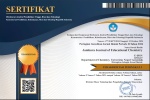Pengaruh Penggunaan Isu Sosiosaintifik dalam Model Pembelajaran Berbasis Masalah Terhadap Keterampilan Berpikir Tingkat Tinggi Siswa
Abstract
Keywords
Full Text:
PDFReferences
Al-Tabany, T.I.B. (2014). Mendesain Model Pembelajaran Inovatif Progresif dan Kontekstual. Prenadamedia Group.
Badan Standar Nasional Pendidikan. (2006). Standar Isi Untuk Satuan Pendidikan Dasar dan Menengah Standar Kompetensi dan Kompetensi Dasar. BSNP
Badan Standar Nasional Pendidikan. (2010). Paradigma Pendidikan Nasional Di Abad-21. BSNP.
Departemen Pendidikan Nasional. (2006). Permendiknas No 22 Tahun 2006 Tentang Standar Isi. Depdiknas.
Heong, Y.M., Othman, W., Yunos, J.M., Kiong, T.T., Hassan, R.B, dan Mohamad, M.M. (2011). The Level of Marzano Higher Order Thinking Skills among Technical Education Students. International Journal of Social Science and Humanity, 1 (2): 121-125.
Hutagaol, K. (2013). Pembelajaran Kontekstual Untuk Meningkatkan Kemampuan Representasi Matematis Siswa Sekolah Menengah Pertama. Jurnal Ilmiah Program Studi Matematika Stkip Siliwangi Bandung, 2 (1): 85 - 99.
Krathwohl, D.R. 2002. A Revision of Bloom's Taxonomy: An Overview. Theory into Practice, 41 (4): 212 - 218.
Magsino, R. M. (2014). Enhancing Higher Order Thinking Skills in a Marine Biology Class through Problem-Based Learning. Asia Pacific Journal of Multidisciplinary Research, 2 (5): 1-6.
Mazfufah, N. (2017). Pengaruh Metode Diskusi Isu-isu Sosio-saintifik Terhadap Kemampuan Penalaran Ilmiah Peserta Didik. Skripsi Program Sarjana Universitas Islam Syarif Hidayatullah.
Mulyatiningsih, E. (2012). Metode Penelitian Terapan Bidang Pendidikan. Alfabeta.
Nichols dan Zeidler. (2009). Socioscientific Issues: Theory and Practice. Journal of Elementary Science Education, 21 (2): 49 - 58.
Osman, K., Hiong, L.C dan Vebrianto, R. (2013). 21 st Century Biology: An Interdisciplinary Approach of Biology, Technology, Engineering and Mathematics Education. Procedia-Social and Behavioral Science. 102 (2013): 188 - 194.
Öztürk, A dan Doğanay, A. (2019). Development of Argumentation Skills through Socioscientific Issues in Science Course: A Collaborative Action Research. Turkish Online Journal of Qualitative Inquiry (TOJQI), 10 (1): 52-89. DOI: 10.17569/tojqi.452426.
Pratiwi, Y.N., Rahayu, S dan Fajaroh, F. (2016). Socioscientific Issues (SSI) In Reaction Rates Topic and Its Effect on the Critical Thinking Skills of High School Students. Jurnal Pendidikan IPA Indonesia. 5 (2): 164-170. DOI: 10.15294/jpii.v5i2.7676.
Ratcliffe, M., dan Grace, M. (2003). Science education for citizenship Teaching Socio-Scientific Issues. Open University Press.
Sastrawati, E., Rusdi, M dan Syamsurizal. (2011). Problem-Based Learning, Strategi Metakognisi, dan Keterampilan Berpikir Tingkat Tinggi Siswa. Tekno-Pedagogi, 1 (2): 1-14.
Surat, I.M. (2016). Pembentukan Karakter Dan Kemampuan Berpikir Logis Siswa Melalui Pembelajaran Matematika Berbasis Saintifik. Jurnal EMASAINS, 5 (1): 57 - 65.
Tan, O.S. (2003). Problem-Based Learning Innovation. Cengange Learning Asia Ltd.
Turiman, P., Omar, J., Daud, A.M dan Osman, K. (2012). Fostering the 21st Century Skills through Scientific Literacy and Science Process Skills. Procedia - Social and Behavioral Sciences, 59 (2012): 110 - 116.
Wulandari, B dan Surjono, H.D. (2013). Pengaruh Problem-Based Learning terhadap Hasil Belajar ditinjau dari Motivasi Belajar PLC di SMK. Jurnal Pendidikan Vokasi, 3 (2): 178-191.
Zeidler, D.L., Sadler, T.D., Applebaum, S, dan Callahan, B.E. (2009). Advancing reflective judgment through socioscientific issues. Journal of Research in Science Teaching, 46 (1): 74 - 101.
DOI: https://doi.org/10.34312/jjec.v2i1.4265
Refbacks
- There are currently no refbacks.
Editorial Office

|
Department of Chemistry, Universitas Negeri Gorontalo |

|
E-mail: [email protected] |

|
|

|
Jambura Journal of Educational Chemistry (p-ISSN: 2655-7606 | e-ISSN: 2656-6427) by Department of Chemistry Universitas Negeri Gorontalo. This work is licensed under a Creative Commons Attribution 4.0 International License. Powered by Public Knowledge Project OJS |










